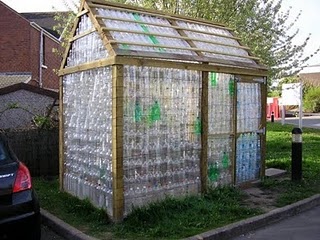Reuse

So many products we buy end up in landfill within the space of a few months. Clothing, plastic bags, computers - loads of everyday items can be reused instead of dumped. Have you ever reused an empty ice-cream tub for storing leftovers instead of just throwing it out? That's how easy it is to reuse everyday products and materials. By reusing items, we also avoid the costs that would be involved if we were to recycle them or dispose of them as waste.
Did you know?
- Reusing uses less energy than recycling.
- If you lined up all the polystyrene foam cups made in just 1 day they would circle the earth.
Some tips for reusing household items:
- Start a bits and bobs drawer - keep old wrapping paper and ribbons.
- Bring your old glasses back to the opticians for use in the developing world.
- Bring your old mobile phone back or send it to a company that can recylce it.
- Recycle ink cartridges or get refillable ones for your home printer.
- Bring books to your nearest second hand book store.
- Use your local library.
- Share magazines with friends or bring them to your local doctor’s practice.
- Use both sides of the page – encourage work colleagues to do likewise so everyone can save 50% of the paper they use.
• Save more paper by changing your margins from 2.54 cm to 2 cm. This will reduce the amount of paper you require by eight percent with hardly any effort! Here's how: 1. In Microsoft Word, under the File menu, choose Page Setup 2. Change all margins from 2.54 cm to 2 cm 3. Before clicking OK, click Default to change your default settings so that every new document will automatically have these margins. - Cut your resource use by half again by printing 2 pages on each side of the page. Go to: File/Print/Properties/2 pages per sheet to do this.
- Reuse as much as possible! You can reuse scrap paper for writing notes or bind it to make a notepad; reuse envelopes by sticking a label over the old address; reuse bags instead of taking another paper or plastic one, especially in clothes stores; mend clothes and get shoes re-heeled so they last longer; give unwanted clothes, furniture, bric-a-brac or books to family, friends and charity shops or have a car boot sale.
- Don't forget to buy from charity or second-hand shops too and pick up lots of authentic bargains. Refurbish your sofa to create a fresh new look instead of buying a new one.
- Look for long lasting (and energy efficient) appliances when buying new electrical items - keep them well-maintained to increase their life cycle and repair them when necessary.
- Take your packed lunch in a sandwich box instead of wrapping it in kitchen foil or cling film.
- Reuse empty jam jars and old ice-cream tubs for storage or keeping leftovers.
- Use Styrofoam or broken crockery as drainage in plant pots.
- If you've really finished with that computer, send it to be refurbished or resold.
Reusing Options
| Disposible item | Alternative | |
|---|---|---|
| 1 | Paper towels | Washable tea towels |
| 2 | Plastic cling wrap | Reusable containers with lids |
| 3 | Plastic Bin liners | Line kitchen bins with newspaper or old plastic shopping bags |
| 4 | Paper dust cloths (“j-cloths”) | Washable dusters |
| 5 | Razors | Replaceable-blade razors |
| 6 | Pens | Refill only or a fountain pen |
| 7 | Paper Napkins | Washable cloth napkins |
| 8 | Batteries | Rechargeable batteries |
| 9 | Paper kitchen towels | Washable dishcloths |
| 10 | Styrofoam cups | Washable cups |
| 11 | Paper plates | Washable plates |
| 12 | Plastic cutlery | Washable cutlery |

